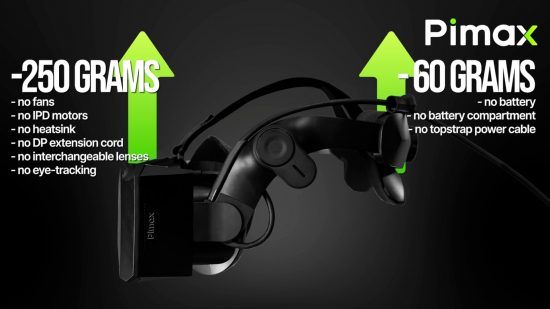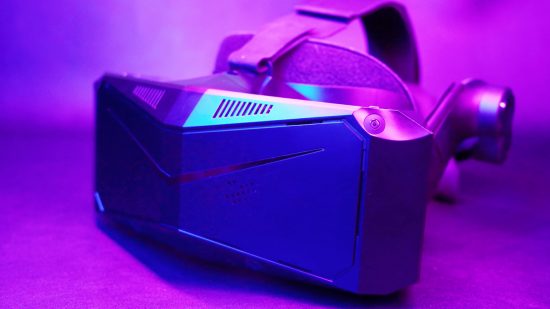During its Frontier event, Pimax unveiled the Crystal Light VR headset, its price conscious device targeting a much broader audience than its premium Crystal offering. The headline is an MSRP less than half that of the Crystal, while standalone features are removed in favor of a focus on PCVR.

It may sound counterintuitive, but by removing a lot of features that created such a premium product in the Pimax Crystal, the Light could actually become one of the best VR headsets exclusively for PCVR play.
Pimax frames the Crystal Light as a “streamlined iteration of the Pimax Crystal”, meaning it retains many of the specs that made the Crystal a success. However, it removes many features that even the most fervent of Crystal fans will know didn’t quite offer much to the value of the headset.
First up, standalone use is gone entirely, meaning no battery, XR2 processor, or internal storage is needed, thus reducing the overall weight of the Crystal Light significantly. Light in name and nature.

Next up is the removal of the automatic IPD, which is slightly disappointing, but the Crystal Light still has the full 58-27mm range. You can also no longer change the lenses with the Crystal Light, as this has been removed.
Looking forward to what the Pimax Crystal Light brings to the table, it’s now perfectly placed to tackle high-end PCVR, with the same dual-processor engine, inside-out tracking, and 2880×2880 per eye resolution as the standard Crystal headset. The 120Hz refresh rate also remains the same.
Its display is still QLED, with a mini-LED option to be available also. While Pimax also revealed the Crystal 60G Airlink, a device to turn its crystal headsets wireless for PCVR play, the Crystal Light is not compatible with the tech due to the removal of its battery, which is unfortunate, but understandable given the need to create a more affordable mainstream headset.
The Pimax Crystal Light will be available from May 2024 and has an MSRP of $699, a huge $900 saving versus the Crystal headset. This should create a real problem for anyone who is looking to get into PCVR and even those who already own a headset like the Valve Index.
Not only because of the track record that Pimax has with powerful VR headsets but also because it is finally meeting consumers at an attractive price. The Pimax Crystal Light is launching at a very similar price to where the Valve Index still sits as a brand new product, although there are plenty of headsets that have since hit the secondary market.
If you already own a VR headset and are looking for something to play, check out the best VR games on PC, all of which come with our highest recommendation.
